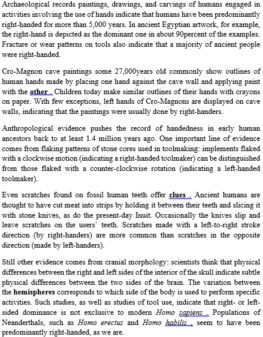Read the following passage and mark the letter A, B, C or D on your answer sheet to indicate the correct answer to each of the questions from 19 to 25.
Foot racing is a popular activity in the US. It is seen not only as a competitive sport but also as a way to exercise, to enjoy the camaraderie of like-minded people, and to donate money to a good cause. Though serious runners may spend months training to compete, other runners and walkers might not train at all. Those not competing to win might run in an effort to beat their own time or simply to enjoy the fun and exercise. People of all ages, from those of less than one year (who may be pushed in astrollers) to those in their eighties, enter into this sport. The races are held on city streets, on college campuses, through parks, and in suburban areas, and they are commonly 5 to 10 kilometers in length.
The largest footrace in the world is the 12-kilometer Bay to Breakers race that is held in San Francisco every spring. This race begins on the east side of the city near San Francisco Bay and ends on the west side at the Pacific Ocean. There may be 80.000 or more people running in this race through the streets and hills of San Francisco. In the front are the serious runners who compete to win and who might finish in as little as 35 minutes. Behind them are the thousands who take several hours to finish. In the back of the race are those who dress in costumes and come just for fun. One year there was a group of men who dressed like Elvis Presley, and another group consisted of firefighters who were tied together in a long line and who were carrying a fire hose. There was even a bridal party, in which the bride was dressed in a long white gown and the groom wore a tuxedo. The bride and groom threw flowers to bystanders, and they were actually married at some point along the route.
The word “costumes” as used in paragraph 2 most likely refers to
A. outfits
B. uniforms
C. cloaks
D. suits




Đáp án A.
Key word: costumes, paragraph 2.
Clue: “In the back of the race are those who dress in costumes and come just jor fun”: Ở phía sau của đoàn đua là những người mặc ... và chỉ tới đây cho vui.
Phân tích:
A. outfits: trang phục, quần áo
B. uniforms: đồng phục
C. cloaks: ảo choàng
D. suits: vest
Ở đây chỉ đề cập đến những người bình thường mặc một bộ quần áo nào đó và đến đây vui chơi. Do họ không có mục đích cụ thể gì nên những gì họ mặc không nhất thiết phải đồng nhất giống nhau. Vì vậy, đáp án phù hợp nhất là A.